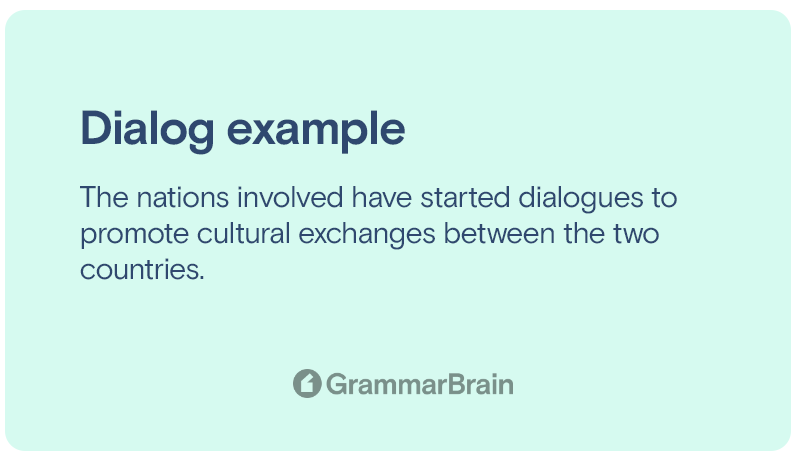Is it a dialog or dialogue? Readers rely on characters in a story to express their thoughts through conversations with another character for a plot to advance. It is common to encounter a speech where two or more characters are engaged in a conversation in a novel or film.
What word do you recall is best suited to describe that form of speech?
Is there a difference between the two?
Differences Between Dialog and Dialogue
The primary difference between dialog and dialogue is the preference between American vs. British English. Dialog appears to be an alternative spelling of dialogue for regions in North America. On the other hand, dialogue is the preferable word in the context of a conversation in British English.
According to Merriam-Webster’s dictionary, dialogue is the more popular variant between the two. The online dictionary also implies that both words can be used interchangeably. But, they both carry the same definition of being the conversational element in written forms or speeches.
But, there is a unique evolution of the word dialog in the American English setting. The spelling dialog began to become known in the computing context around the 1980s. Until today, this context shift makes dialog the word of choice in computer terms.
If you are a writer, you should take note that the AP Stylebook recommends a longer dialogue than its alternative.
Origin of the Word Dialogue
The origin of the word dialogue traces back to the Greek dialogos. Dia means ‘through’ which suggests movement. Logos can be inferred as ‘word’ or ‘speech’. “Dia-logos” is therefore a form of speech exchange that flows between speakers.
Dialogue/Dialog: A Noun or a Verb?
As stated by the Oxford Learner’s Dictionaries, dialogue as a noun refers to conversations between characters in literary materials such as a book, play, or film. It also denotes formal discussions between political parties including nations or countries.
Interestingly, dialogue can also be a verb as outlined in Dictionary.com. When using the word in this manner, it would carry the meaning ‘to converse together’ or ‘to perform dialogue in a film, play, etc. In a sentence, the verb takes the form of dialogues, dialogued, and dialoguing.
According to The American Heritage Dictionary, the use of dialogue or dialog as a verb may be widespread but the majority of their Usage Panel dislikes its construction in a sentence.
Plus, the AP Stylebook refers to dialogue only as a noun, so it’s best to avoid it in your writing.

Examples of Dialogue/Dialog in a Sentence
Note that in all these instances dialogue is interchangeable with dialog.
Noun
- The nations involved have started dialogues to promote cultural exchanges between the two countries.
- Most theatrical plays are written in dialogue.
- I prefer a peaceful dialogue rather than chaotic violence.
- The book has interesting dialogues but the plot is weak.
Verb
- Steve wanted to dialogue with his overseas counterparts about the prospect of his investment.
- He expressed that he refused to dialogue with his competitors.
- After dialoguing with her manager, Lisa went back to work.
How to Use Dialog in Computing Context
- Select an option from the dialog box.
- If you trigger the dialog box, you may be given more command options.
- The run dialog allows the user to run the operating system.
- You can change the color scheme of the hyperlink through the Color Scheme dialog.
- This button brings up the Select Data Source dialog box.
Conclusion on Dialogue vs. Dialog
Both dialogue and dialog are accepted as a noun that refers to a conversation exchange between 2 individuals. They differ in the sense that dialog is typically favored in American English, while dialogue is typical in British English.
Dialog is also more commonly used as a computing term in recent years.
However, most dictionaries agree that both dialog and dialogue share the same meaning and are interchangeable.
Inside this article
Fact checked:
Content is rigorously reviewed by a team of qualified and experienced fact checkers. Fact checkers review articles for factual accuracy, relevance, and timeliness. Learn more.
Core lessons
Glossary
- Abstract Noun
- Accusative Case
- Anecdote
- Antonym
- Active Sentence
- Adverb
- Adjective
- Allegory
- Alliteration
- Adjective Clause
- Adjective Phrase
- Ampersand
- Anastrophe
- Adverbial Clause
- Appositive Phrase
- Clause
- Compound Adjective
- Complex Sentence
- Compound Words
- Compound Predicate
- Common Noun
- Comparative Adjective
- Comparative and Superlative
- Compound Noun
- Compound Subject
- Compound Sentence
- Copular Verb
- Collective Noun
- Colloquialism
- Conciseness
- Consonance
- Conditional
- Concrete Noun
- Conjunction
- Conjugation
- Conditional Sentence
- Comma Splice
- Correlative Conjunction
- Coordinating Conjunction
- Coordinate Adjective
- Cumulative Adjective
- Dative Case
- Determiner
- Declarative Sentence
- Declarative Statement
- Direct Object Pronoun
- Direct Object
- Diction
- Diphthong
- Dangling Modifier
- Demonstrative Pronoun
- Demonstrative Adjective
- Direct Characterization
- Definite Article
- Doublespeak
- False Dilemma Fallacy
- Future Perfect Progressive
- Future Simple
- Future Perfect Continuous
- Future Perfect
- First Conditional
- Irregular Adjective
- Irregular Verb
- Imperative Sentence
- Indefinite Article
- Intransitive Verb
- Introductory Phrase
- Indefinite Pronoun
- Indirect Characterization
- Interrogative Sentence
- Intensive Pronoun
- Inanimate Object
- Indefinite Tense
- Infinitive Phrase
- Interjection
- Intensifier
- Infinitive
- Indicative Mood
- Participle
- Parallelism
- Prepositional Phrase
- Past Simple Tense
- Past Continuous Tense
- Past Perfect Tense
- Past Progressive Tense
- Present Simple Tense
- Present Perfect Tense
- Personal Pronoun
- Personification
- Persuasive Writing
- Parallel Structure
- Phrasal Verb
- Predicate Adjective
- Predicate Nominative
- Phonetic Language
- Plural Noun
- Punctuation
- Punctuation Marks
- Preposition
- Preposition of Place
- Parts of Speech
- Possessive Adjective
- Possessive Determiner
- Possessive Case
- Possessive Noun
- Proper Adjective
- Proper Noun
- Present Participle
- Prefix
- Predicate



